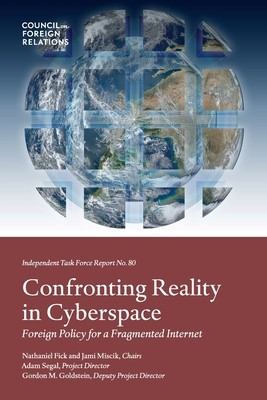
- We will send in 10–14 business days.
- Author: Adam Segal
- Publisher: Council on Foreign Relations Press
- ISBN-10: 0876094515
- ISBN-13: 9780876094518
- Format: 15.2 x 22.9 x 0.6 cm, minkšti viršeliai
- Language: English
- SAVE -10% with code: EXTRA
Reviews
Description
The early advantages the United States and its allies held in cyberspace have largely disappeared as the internet has become increasingly fragmented, more dangerous, and less free. China and Russia in particular are working to export their authoritarian models of the internet around the world. While freedom on the internet declines, threats in cyberspace grow. Cybercrime and cyberattacks on critical infrastructure have cost billions of dollars worldwide and disrupted thousands of lives. And while the U.S. response has focused on domestic policy and resilience, more attention should be paid to rethinking a vision of foreign policy for cyberspace. Confronting Reality in Cyberspace: Foreign Policy for a Fragmented Internet outlines a strategy founded on three pillars: building a trusted internet coalition, employing more targeted pressure on adversaries and establishing pragmatic cyber norms, and getting the U.S. house in order.
The Council on Foreign Relations sponsors Independent Task Forces to assess issues of current and critical importance to U.S. foreign policy and provide policymakers with concrete judgments and recommendations. Diverse in backgrounds and perspectives, Task Force members aim to reach a meaningful consensus on policy through private deliberations. Once launched, Task Forces are independent of CFR and are solely responsible for the content of their reports. Task Force members are asked to join a consensus signifying that they endorse the general policy thrust and judgments reached by the group, though not necessarily every finding and recommendation. Each Task Force member also has the option of putting forward an additional or a dissenting view.
EXTRA 10 % discount with code: EXTRA
The promotion ends in 22d.22:03:42
The discount code is valid when purchasing from 10 €. Discounts do not stack.
- Author: Adam Segal
- Publisher: Council on Foreign Relations Press
- ISBN-10: 0876094515
- ISBN-13: 9780876094518
- Format: 15.2 x 22.9 x 0.6 cm, minkšti viršeliai
- Language: English English
The early advantages the United States and its allies held in cyberspace have largely disappeared as the internet has become increasingly fragmented, more dangerous, and less free. China and Russia in particular are working to export their authoritarian models of the internet around the world. While freedom on the internet declines, threats in cyberspace grow. Cybercrime and cyberattacks on critical infrastructure have cost billions of dollars worldwide and disrupted thousands of lives. And while the U.S. response has focused on domestic policy and resilience, more attention should be paid to rethinking a vision of foreign policy for cyberspace. Confronting Reality in Cyberspace: Foreign Policy for a Fragmented Internet outlines a strategy founded on three pillars: building a trusted internet coalition, employing more targeted pressure on adversaries and establishing pragmatic cyber norms, and getting the U.S. house in order.
The Council on Foreign Relations sponsors Independent Task Forces to assess issues of current and critical importance to U.S. foreign policy and provide policymakers with concrete judgments and recommendations. Diverse in backgrounds and perspectives, Task Force members aim to reach a meaningful consensus on policy through private deliberations. Once launched, Task Forces are independent of CFR and are solely responsible for the content of their reports. Task Force members are asked to join a consensus signifying that they endorse the general policy thrust and judgments reached by the group, though not necessarily every finding and recommendation. Each Task Force member also has the option of putting forward an additional or a dissenting view.


Reviews